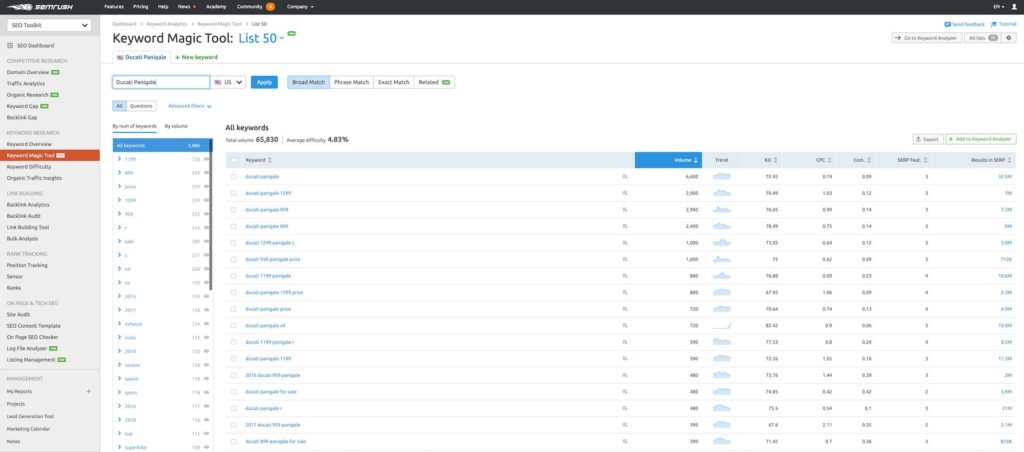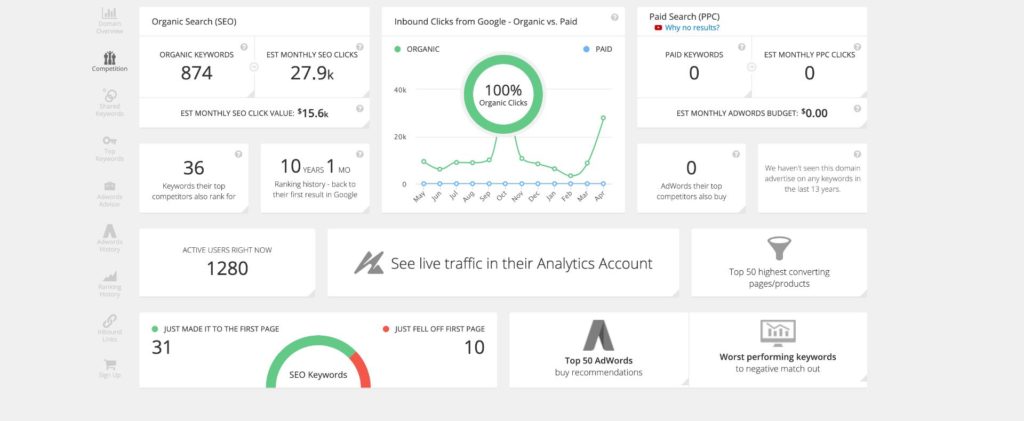Keyword Research Tool Guide 2019: Which is Best for You?
Content is the backbone of quality SEO. This is an undisputed fact. As SEOs, we all want to create great content, and finding the right keywords is a major factor in deciding how to do that. But we often fall back on the same tools without really questioning what others exist.
I call this the Google Keyword Planner Trap. The reason most rely on KW planner? It’s from Google, showing keywords straight from the source, and provides traffic and difficulty data. That’s all great, but there’s an entire world out there beyond the comfortable, security blanket of Google tools.
It’s time to take that journey. Let’s compare some of the best keyword research tools of 2019, and find out which ones will work best for you. Not all are just for keyword research; some are also for analyzing competitor keyword ranking, which assist in your keyword research strategy.
Spoiler Alert: It never hurts to use all the resources available to you.
1. Google Keyword Planner
Let me start by backtracking. The Google Keyword Planner is definitely a great tool, but SEOs sometimes forget that its main purpose is to research for upping your paid traffic game with Google Ads. It’s technically free, but to get specific monthly keyword searches, you must create a larger account. Without one, you can only see general ranges for each keyword.
2. Search Console
Google Search Console (GSC) is yet another Google tool and provides endless information. And it’s free – but will only give you data for the websites you have attached to it. If you can’t afford other SEO tools, the information you can get from Google Search Console (formerly Webmaster Tools) is excellent for strategizing (for example, finding keywords with high impressions and low click-through rates, and evaluating progress).
3. BrightEdge Data Cube
If you are looking for a comprehensive paid tool, BrightEdge provides keyword suggestions, competitive information, and more. They have everything that will help you find the search terms that will bring traffic to your website and implement the right strategy to do so.
4. SEMrush
A favorite among top digital marketers, including ContentMender. SEMrush’s keyword research tool dominates in the competitive keyword research field and provides a large range of keywords compared to other tools. It’s also very intuitive and takes little time to become accustomed to. Plus its popularity means that there are tons of tutorials on how to use it in creative ways.

5. Ahrefs
Another popular option, Ahrefs Keyword Explorer has all of the basic functions you look for in a keyword tool, plus you can see the percentage of searches that click, the keyword difficulty scores, and a SERP overview, which adds to its competitive abilities. Beyond keywords, Ahrefs is an incredible tool for backlink research. Search Engine Journal recently reported that Ahrefs had announced a plan to launch a new search engine; that takes much energy and skill, making Ahrefs a tool to certainly check out.
6. Moz
Moz Explorer is excellent for tracking, giving topic-related keyword suggestions, and finding keywords with low competition. Plus, their Mozbar tool makes SEO efficient and easy, showing the Domain Authority (DA) for every website in the search results. Moz has a wealth of useful tools, both free and paid, so find what is useful to you!
7. Keyword Tool.io
Keywordtool.io is best used to complement other keyword tools by providing long-tail variants of the target keywords you have already researched, allowing you to avoid keyword stuffing in favor of creating a well-rounded theme in your content. It’s also on the “more affordable” end of the spectrum.
8. KWFinder
KWFinder provides recommendations and separates them out into categories, one of which is questions. The ability to see the kinds of questions searchers are asking can give vital insight.
9. Similarweb
If you are looking for traffic estimates, Similarweb is the tool for you. This tool is great for looking at what top keywords your compeitor is ranking for, and find any trends among the competitors. Find the keyword trends that will help your content marketing strategy excel.

10. SpyFu
For competitive keyword data, SpyFu has you covered. Their paid tool is particularly useful for PPC research, their SEO component is also quite thorough. The data you can uncover will make you feel like a private detective.
11. Keywords Everywhere
Keywords Everywhere is a really cool extension that provides the monthly keyword searches and lists of similar keywords of your search queries.
12. Soovle
Another extension, if you are looking for the CPC of keywords across various search engines, Soovle is here to help. Don’t be fooled by its old school appearance- the creators must have spent more time creating a quality product than updating the look because this tool is as good as it is underutilized.
13. Keyword Shitter
Great for content marketing, if you have a few seed keywords and want to find a huge variety of similar keyword ideas, plug them into this free tool. Don’t forget to check out the Keyword Shitter blog; it’s not always the most informative, but it does provide a moment of levity in your keyword search.
Concluding Thoughts
The tools that you use are unique to what you need. This keyword research tools comparison is a good starting point, but you will have to find what works for you. Let us know if you agree or what tools you find particularly useful.


![How to Do Competition Analysis for SEO [5 Simple Tips]](https://contentmender.com/wp-content/uploads/2022/01/How-to-Do-Competition-Analysis-for-SEO-5-Simple-Tips-uai-2418x1612.png)

